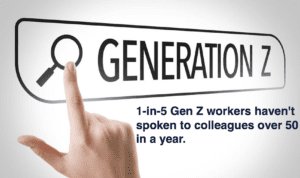1-in-5 Gen Z workers haven’t spoken to colleagues over 50 in a year.
There are notable differences between the younger generation and previous generations, such as our parents and grandparents.
Gen Z is often characterised as demanding, opinionated, and outspoken. They are also seen as the generation most likely to hold their employers accountable for their promises.
The distinctiveness of Gen Z has been both celebrated and criticised, largely due to a misunderstanding of their behaviour, particularly by older employees.
This divide is exemplified by a recent LinkedIn study, which found that one in five Gen Z employees have not spoken to a colleague over the age of 50 in the past year. Conversely, 40% of those over 55 have not had conversations with Gen Z colleagues during the same period.
This disconnect poses a growing issue in the workplace, particularly in intergenerational companies, where staff members from different age groups, with varying concerns and experiences, struggle to communicate with one another and, as a result, tend to avoid interactions.
This situation is detrimental to businesses, and employers must find ways to effectively integrate their staff within a diverse company. The research suggests that although Gen Z employees are confident in expressing their thoughts and feelings to their managers, they do not always feel comfortable communicating with more experienced colleagues.
Another report indicates that one of the main reasons for this is that younger workers feel they lack common ground with older colleagues due to differences in personal life stages, such as not having pets, spouses, or children.
However, without intergenerational communication, innovation, growth, and a healthy work culture are compromised. To foster an environment that encourages such communication, employers should respect the differences between generations while creating opportunities for people to engage in ways that they feel comfortable with.
Research shows that face-to-face communication is valued by all generations, so providing opportunities for in-person meetings can facilitate more informal points of contact.
Gen Z also prioritises personal development in the workplace. Employers can leverage the experience of older workers by creating mentoring programs that allow young people to fulfil their desire to learn while simultaneously building stronger intergenerational bonds.
Being aware that younger employees may feel disconnected from their older colleagues should motivate employers to create spaces for meaningful communication. Ultimately, the quality of these relationships reflects the quality of the business itself.


